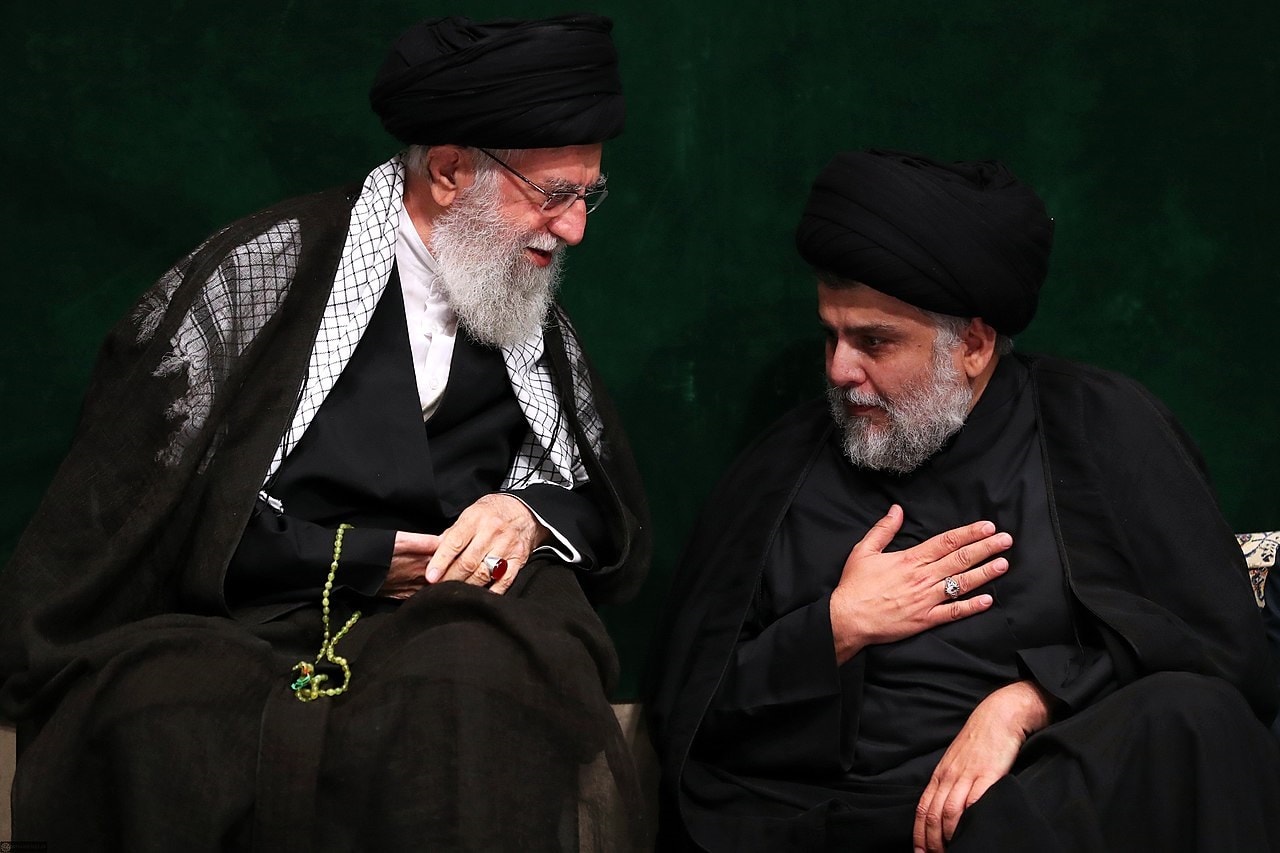Iraq’s political stalemate continues almost nine months after elections. Earlier this month, Muqtada al-Sadr, whose movement won a plurality, called on his 73 parliamentary supporters to resign. He denied he acted under Iranian pressure and then, perhaps to distract his followers from his own bizarre maneuverings, lashed out at President Barham Salih for allegedly refusing to sign Sadr’s one achievement in the new parliament: Making relations with Israel a capital offense. “It is extremely shameful that the so-called President of the Republic of Iraq has refused to sign the law,” Sadr tweeted. Sadr’s real problem with Barham is less Israel than Sadr’s own political frustration. The president, after all, raised no objections, and Iraq’s official gazette published notice of the law against fraternizing with Israelis on June 20, 2022.
Sadr is a master chameleon, often changing his spots as he shifts sponsors. For years after the 2003 U.S.-led invasion of Iraq, Sadr enjoyed Iranian support. His rhetoric was nationalist, but money flowed from Tehran to ensure he had a huge blind spot with regard to Iranian violations of Iraqi sovereignty. He subsequently buried sectarian grievances and shifted more to the Saudi and Emirati camps.
Again, money talks.
The root of Sadr’s immediate frustration was that, plurality aside, he was unable to usher in a new government, one in which his cousin Jaafar al-Sadr, son of Da’wa Party founder Muhammad Baqir al-Sadr, would become prime minister. Sadr had struck a bargain with Kurdistan Democratic Party (KD) leader Masud Barzani who wanted the presidency for his party. The KDP is both tribal and corrupt, however. Barzani at first appointed his own uncle, Hoshyar Zebari, whom the Iraqi parliament had previously impeached for corruption.
Make no mistake: Zebari was guilty. His only plausible defense was selective prosecution. Regardless, Iraq’s Supreme Court threw out Zebari’s nomination, and Barzani then nominated Rebar Ahmed Khalid, an unpopular member of the local security services. Iraqis may see Barham as a cynic and criticize his ambition, but they do not doubt his competence or his ability to reach across Iraq’s ethnic and sectarian landscape or his influence on the global stage. Barham’s Rolodex ranges from Grand Ayatollah Ali Sistani to Pope Francis to Queen Elizabeth II to Supreme Leader Ali Khamenei to President Joe Biden.
Rebar’s rolodex has only one name: Masud Barzani.
That Sadr embraced the Barzanis and sought to tar Barham as a defender of Israel is bizarre. After all, the Barzanis have been at the forefront of relations with the Jewish state. Mulla Mustafa Barzani, the father of Masud whom the KDP lionizes, visited Israel twice, happily posing for photos with Israel’s president. Nor was Mulla Mustafa the only one. In 2008, Nechirvan Barzani who serves Masud as the Kurdistan Regional Government’s rubber-stamp president, reportedly visited Israel secretly while on his way to the United States. Nor was he the only Barzani to do so after Mulla Mustafa’s death. Simply put, if Sadr were serious about demonizing Israel, the last family with whom he would ally with would be the Barzanis.
Sadr’s boilerplate denunciations of Israel and his supposed embrace of the Palestinian cause also fall flat given that he now welcomes support from the same Gulf Arab countries who are at the forefront of normalization with Israel. What Sadr illustrates is that given a choice between principle and cash, he chooses cash.
Iraq has a more complicated relationship with Israel than many other Arab states, including those who took part in the Abraham Accords. Bahrain, Morocco, and the United Arab Emirates did not previously recognize Israel, but they did not go to war with Israel either. Iraq, however, was a combatant in the Arab-Israeli wars. In 1948, Iraqi forces seized the West Bank. At the war’s conclusion, Iraq’s king, who would be overthrown a decade later, transferred the territory to Jordan whose king was the cousin to Iraq’s. Iraqi forces also participated in the 1967 Six Day War and Iraq sent an expeditionary force to Syria during the 1973 Yom Kippur War.
While many Iraqis are not particularly fond of Palestinians due to Saddam’s preferential treatment of Palestinians and Palestinian apologetics for the late Iraqi dictator, this does not mean they support Israel politically. Indeed, Iraqis overwhelmingly support the Palestinian cause, even if they do not see the Israel-Palestinian conflict as among their top ten priorities. Indeed, when it comes to capital crimes, more Iraqis would seek the application of the death penalty against corruption.
That Sadr embraced Iraq’s most corrupt family and its most permissive toward Israel for the sake of his own personal power certainly leaves them scratching their heads. Sadr may seek to tear Barham down, but if Sadr’s followers truly want to demonstrate their anti-Zionist credentials, they might start to question Sadr’s own choices.
Expert Biography – Now a 1945 Contributing Editor, Dr. Michael Rubin is a Senior Fellow at the American Enterprise Institute (AEI). Dr. Rubin is the author, coauthor, and coeditor of several books exploring diplomacy, Iranian history, Arab culture, Kurdish studies, and Shi’ite politics, including “Seven Pillars: What Really Causes Instability in the Middle East?” (AEI Press, 2019); “Kurdistan Rising” (AEI Press, 2016); “Dancing with the Devil: The Perils of Engaging Rogue Regimes” (Encounter Books, 2014); and “Eternal Iran: Continuity and Chaos” (Palgrave, 2005).

